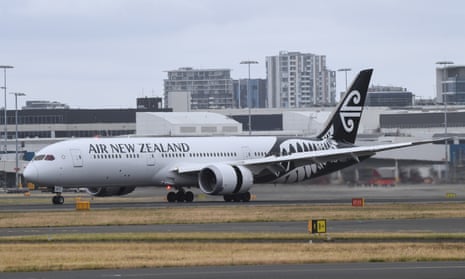Prime minister Jacinda Ardern has asked for the Ministry of Foreign Affairs and Trade to investigate after it was revealed an Air New Zealand company worked on the engine of a Saudi Arabian navy ship.
The national carrier for New Zealand, which is majority-owned by the government, is facing mounting questions after a TVNZ investigation revealed some of its specialist engineers worked on two engines and one power turbine for the royal navy of Saudi Arabia though a third-party company in 2019.
Ardern said the contract arrangement was “completely wrong” and “it just doesn’t pass New Zealand’s sniff test”.
“This is something that has ramifications for New Zealand, its reputation, and that’s why we are making sure we are across how it happened,” Ardern said, on the first sitting day for New Zealand’s parliament, and the start of Ardern’s second term as prime minister.
“We do have obligations as a country to make sure that we are applying, for instance, UN sanctions and so on. Whilst it’s not clear whether what happened here would have fallen within that, there are still reputational issues.”
A Saudi-led offensive into Yemen has resulted in hundreds of thousands of civilian deaths, as well as widespread malnutrition and a refugee crisis across the impoverished gulf nation.
The years-long war has been described by the United Nations as the world’s worst humanitarian crisis, and the Red Cross has warned for three years in a row Yemen is the country most at risk of “humanitarian catastrophe”.
According to the UN, 80% of Yemen’s 30 million people need some form of aid or protection.
Last week US president Joe Biden announced the US would end its support for the Saudi campaign in Yemen. The US supplies 70% of the country’s arms and has also provided technical, logistical and intelligence support to the country since 2015.
Greg Foran, the CEO of Air New Zealand, said he became aware of the contract only recently and the arrangement was immediately halted.
Work on the engines would not resume, Foran said, and he had no oversight over the decision to repair the engines, as the contract was for a “relatively small” NZ$3m and did not reach his desk.
“This was not a secret deal, our involvement was through a third party and should not have happened. It won’t be repeated.” Foran said in a statement.
The company said Air New Zealand was one of only a handful of facilities in the world licensed to repair a certain type of engine used on large vessels, and this had led to the Gas Turbines business being contracted to work on naval ship engines from New Zealand, the United States and Australia, as well as Saudi Arabia.
“The business also occasionally contracts to carry out ad hoc overflow work from third party repair facilities. It is through a third-party contract that work has recently been carried out on two engines and one power turbine module from vessels belonging to the Royal Saudi Navy. The Gas Turbines business has not contracted directly with the Royal Saudi Navy and will not be carrying out any further work of this nature.”
Air New Zealand said it would conduct an internal investigation into the incident.
Liberal think tank the New Zealand Alternative said it defied belief that Air NZ had effectively affiliated itself with a country accused of widespread war crimes.
“When a government-owned company has provided services to an overseas military force widely accused of war crimes it is more than an operational matter,” the think tank said in a tweet. “Companies don’t just accidentally end up fixing engines for the Royal Saudi Navy without realising it.”
Amnesty International campaign director Lisa Woods said the airline should have carried out due diligence on any human rights concerns before agreeing to the contract, while deputy prime minister Grant Robertson said he was surprised and alarmed by the connection.
